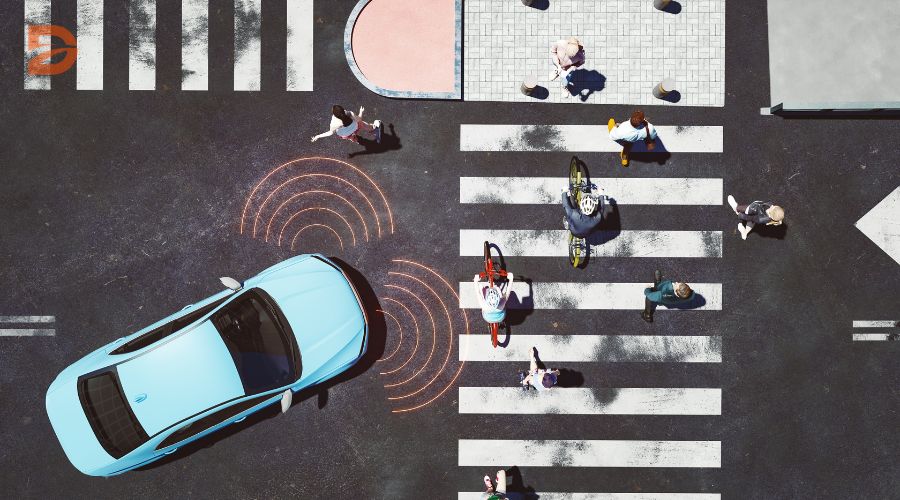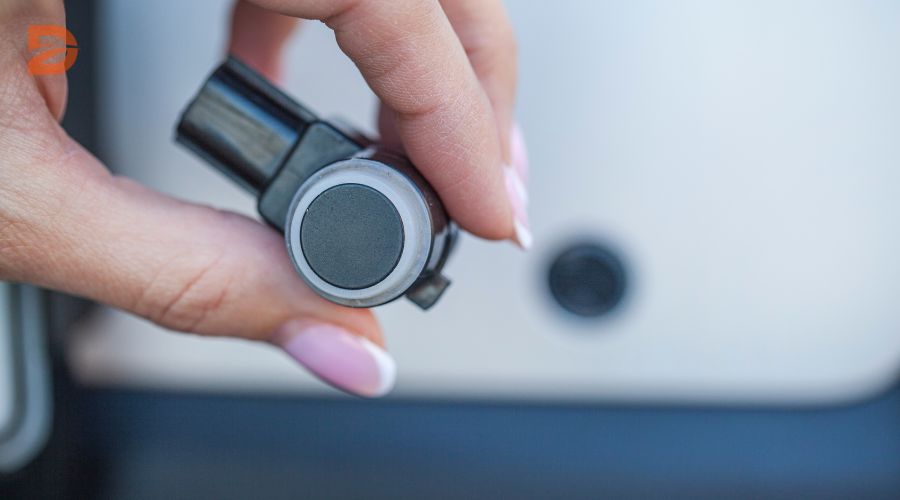According to a 2009 study by the Insurance Institute for Highway Safety (IIHS), vehicles with collision-avoidance systems experienced a remarkable 14-15% reduction in crashes when equipped with automatic braking. This statistic highlights the transformative potential of parking sensors in safeguarding your vehicle and your peace of mind.
Most garages are tight, and squeezing in can be a risky maneuver. Accidents can happen despite your best efforts, leading to costly collisions and dents. Fortunately, today’s parking aids are designed to prevent such mishaps by alerting you to obstacles and guiding you into the spot with laser-guided precision.
Discover the top parking sensors that can revolutionize your garage experience. These advanced technologies not only help you avoid bumps and scrapes but also ease parking stress, maintain garage organization, promote proper garage use, and speed up the parking process.
Key Takeaways
- Parking sensors can reduce crash rates by up to 15% with automatic braking technology.
- Prevent costly collisions and damage to your vehicle with obstacle detection and proximity alerts.
- Ease the stress of parking in tight spaces with guided assistance and blindspot monitoring.
- Maintain a well-organized garage by promoting proper usage and streamlining the parking process.
- Enhance your vehicle’s safety and convenience with the latest parking aid features.
Why You Need Parking Sensors for Your Garage
Parking sensors are a must-have for your garage to prevent costly collisions. Scraping a side mirror on the garage door frame or bumping into the wall can be expensive to repair. Parking aids can detect obstacles and guide you safely into your spot, eliminating these risks.
Prevents Costly Collisions
Garage parking aids can significantly reduce the likelihood of dents, scratches, or more serious accidents. Ultrasonic sensors in parking aids detect nearby objects, reducing the risk of accidental bumps or scrapes.
Eases Parking Stress
Parking sensors, such as the STKR Concepts Adjustable Garage Parking Sensor Aid, utilize laser technology and motion-activated lighting for guidance. This eases the stress of parking in tight spaces by providing visual and auditory cues.
Maintains Organized Garage
Parking aids help maintain an organized garage by designating a specific parking area, preventing the space from being used for storage.
Promotes Proper Garage Use
Tactile sensors like parking mats and rubber curbs offer physical indicators for parking, promoting the proper use of the garage space.
Speeds up the Parking Process
Parking sensors allow you to approach confidently instead of inching in cautiously, speeding up the parking process. The front sensors can detect objects up to four feet, while the back sensors can detect objects up to eight feet, providing precise guidance.
Residential Parking Curbs: A Simple Solution
When parking in public spaces, there are often curbs at each spot to stop you from where you need to be and prevent collisions. Your garage should be no different. Residential parking curbs provide a simple solution to mark the boundaries of your parking area.
These curbs are made of gentle, rubber material that protects your tires and maintains a sleek look in your garage. The biggest advantage is that they take the guesswork out of parking by clearly designating where your front tires should rest.
- Prevent collision prevention and damage to your vehicle
- Protect your tires from wear and tear
- Maintain an organized and efficient garage organization
With residential parking curbs, you can confidently park your vehicle in your garage without worrying about costly mistakes or unsightly tire marks on the floor. This simple solution provides the structure and guidance needed for stress-free parking, ensuring your garage remains a well-maintained and functional space.
Parking sensors, collision prevention: Laser-Guided Precision
For even more accurate parking, a garage parking laser can designate exactly where your vehicle should be positioned. This innovative tool uses a laser to project an X, marking the perfect spot to align your car’s center. It takes the guesswork out of parking in tight spaces, preventing dings and scrapes. The laser is motion-activated, turning on only when it senses your vehicle approaching, and it can be customized to suit your specific garage and vehicle.
In addition to the precision of parking guidance, collision avoidance features are also essential for safe garage parking. Advanced driver assistance systems (ADAS) employ a variety of sensors, including cameras, radar, LiDAR, and ultrasonic technology, to detect obstacles and prevent collisions. These driver assistance features can significantly reduce the risk of accidents, especially in the confined space of a garage.
| Sensor Type | Application | Key Benefits |
|---|---|---|
| Cameras | Parking assistance, lane change warning | Enhance visibility, enable 360-degree monitoring |
| Radar | Collision avoidance, adaptive cruise control | Detect objects at a distance, operate in poor weather |
| LiDAR | Terrain mapping, object detection | Precise measurement of distances, identify smaller obstacles |
| Ultrasonic | Parking assistance, self-parking | Detect nearby objects using high-frequency sound waves |
By combining the precision of a parking laser with the advanced capabilities of collision avoidance sensors, drivers can enjoy a seamless and secure parking experience, even in the most challenging garage environments.
Parking Distance Alert Systems
Navigating your vehicle into a tight garage space can be a nerve-wracking experience, but a parking distance alert system can take the guesswork out of the process. These advanced driver assistance systems remember your preferred stopping distance and provide real-time feedback to help you park with precision.
Parking distance sensors use ultrasonic technology to detect obstacles in front of your car, flashing a warning light and emitting an audible alert when you’re getting too close to the garage wall. The digital display shows the exact distance in inches, training your brain to better gauge the space in front of you.
| Feature | Benefit |
|---|---|
| Ultrasonic Obstacle Detection | Alerts you to fixed objects like walls and vehicles |
| Digital Distance Display | Provides precise measurements to guide your parking |
| Customizable Sensitivity | Allows you to set your preferred stopping distance |
| Audible and Visual Alerts | Warns you when you’re nearing obstacles |
Parking distance alert systems are a valuable garage parking aid, helping drivers avoid costly collision prevention and maintain an organized, driver assistance-friendly garage. With the right parking distance sensor system installed, you can park with confidence and protect your vehicle from damage.
Conclusion
Parking in a tight garage doesn’t have to be a stressful experience. With the right parking sensors, you can avoid costly collisions, maintain an organized garage, and enjoy a smooth, stress-free parking process every time. From residential parking curbs and laser-guided precision tools to distance alert systems, there are a variety of solutions to enhance your vehicle’s safety and make the most of your garage space.
As vehicles continue to evolve with advanced driver assistance technologies, parking sensors remain a fundamental safety feature for responsible vehicle owners. Studies have shown that car safety features can lower the risk of dangerous accidents by 49% and the chance of getting hurt by 53%, emphasizing the importance of these innovative solutions.
Investing in the right parking aids can not only prevent costly collisions and fender benders but also promote proper garage organization and usage. Whether you’re navigating a crowded urban parking lot or maneuvering in your home garage, parking sensors, and related technologies can make the experience seamless and stress-free, enhancing your overall driving experience and contributing to a safer, more organized environment.
FAQ
What are the benefits of using parking sensors?
Parking sensors can help prevent costly collisions, ease parking stress, maintain an organized garage, promote proper garage use, and speed up the parking process.
How can parking sensors prevent collisions in my garage?
Parking sensors detect obstacles and guide you safely into your spot, eliminating the risk of scraping a side mirror on the garage door frame or bumping into the wall.
How do parking sensors ease the stress of parking in tight spaces?
Parking sensors provide visual and auditory cues to help you navigate tight spaces, taking the guesswork out of parking and allowing you to approach confidently instead of inching incautiously.
How do parking sensors maintain an organized garage?
Parking sensors designate a specific parking area, preventing the space from being used for storage and ensuring your garage stays organized.
How do parking sensors promote proper garage use?
Parking sensors prevent the garage space from being used for storage, ensuring it is used for its intended purpose – parking your vehicle.
How do parking sensors speed up the parking process?
Parking sensors allow you to approach your spot confidently, without the need to inch in cautiously, which speeds up the overall parking process.
What are the benefits of using residential parking curbs?
Residential parking curbs provide a simple solution to mark the boundaries of your parking area, taking the guesswork out of parking by clearly designating where your front tires should rest.
How can a garage parking laser improve my parking experience?
A garage parking laser designates exactly where your vehicle should be positioned, taking all the guesswork out of parking in tight spaces and preventing dings and scrapes.
How do distance alert systems enhance parking safety?
Distance alert systems remember your preferred stopping distance and alert you when you’re inching too close to the garage wall, helping you better gauge the distance in front of your vehicle.











